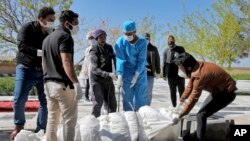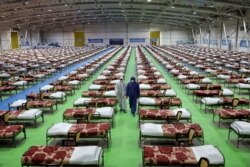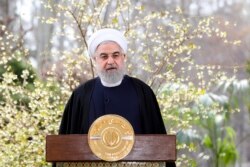Iran says its death toll from the coronavirus has surpassed 3,000. President Hassan Rouhani is also saying that the U.S. missed the opportunity to improve relations with Iran by lifting economic sanctions.
Workers traded insults with angry worshippers Thursday as they welded shut the doors of a famous Shi'ite religious shrine in the city of Shiraz. The Iranian government has officially closed mosques and religious seminaries and suspended Friday prayer services to stop the further spread of the coronavirus.
Official government figures put the death toll from the virus at 3,036 people, with nearly 50,000 people infected. Iranian opposition sources, however, say the death toll has topped 15,000. VOA could not independently confirm the numbers.
Khattar Abou Diab, who teaches political science at the University of Paris, told VOA that anecdotal evidence indicates in some parts of Iran, the situation is "catastrophic.”
He said that in one Kurdish village alone, in Khouzestan province, reports indicate the virus situation is horrendous. He said the Iranian government delayed action on the virus for political and religious considerations at the outset of the crisis, compounding the problem.
However, Iranian government coronavirus task force head Ali Reza Zali told state TV that residents of Tehran were to blame for the spread of the virus because they didn't heed official warnings.
He said the carelessness of some citizens in Tehran led to the high infection rate in all parts of the capital. He added that if everyone had taken proper hygienic measures and stayed home, the virus would not have spread so widely.
Pictures on social media show Iranians lying in the streets, dead or close to dying, due to effects of the coronavirus. Arab media showed amateur video of reported riots in Sepidar, Adel Abad and Sheyban prisons over deteriorating health conditions. Some prisoners reportedly escaped.
On Wednesday, President Rouhani blamed the U.S. for missing what he called a historic opportunity to improve relations with Iran by lifting economic sanctions on his country. He added that the sanctions "have failed to deter our efforts to combat the coronavirus outbreak."
Frictions between the U.S. and Iran over threats by pro-Iranian militia groups to attack U.S. forces in Iraq prompted President Donald Trump to warn Iran not to launch an attack, but to instead give him a call:
"They're having a hard time picking up the phone, or having a hard time setting up a meeting, but they could fix their country pretty easily. We don't want hostility, but if they're hostile to us, they're going to regret it like they've never regretted anything before."
Iranian Revolutionary Guard Corps Commander Gen. Mohammed Bagheri, chief-of-staff of Iran's armed forces, told state TV Thursday, that Iran "is watching U.S military moves closely" and that "the slightest action against Iran's security will be met with a strong defensive response."






